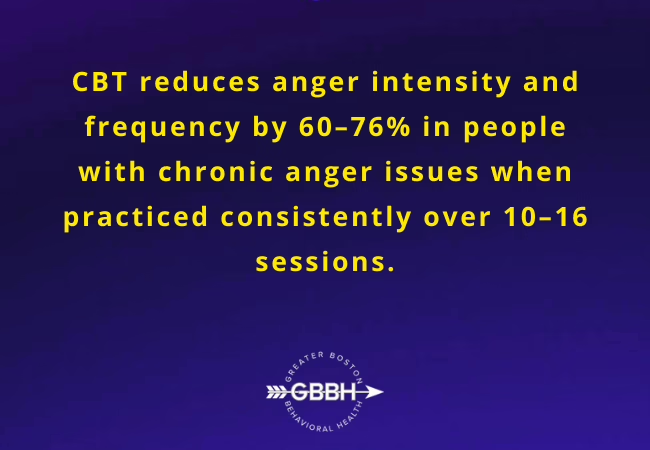Everyone experiences anger. But when anger becomes intense, persistent, or hard to control, it can interfere with work, relationships, physical health, and your overall mental well-being. If you’ve struggled with emotional outbursts, resentment, or chronic irritability, you might feel stuck in a pattern of reactivity that seems impossible to break.
That’s where Cognitive Behavioral Therapy (CBT) comes in. As one of the most effective, evidence-based tools for emotional regulation, CBT plays a critical role in anger management therapy—helping individuals recognize what drives their reactions and giving them the tools to create lasting behavioral change.
At Greater Boston Behavioral Health, CBT is a foundational element of our personalized Anger Management Therapy in Boston, woven into each of our levels of care—from outpatient to intensive inpatient treatment. Whether your anger is externalized through aggression or internalized through resentment and self-criticism, CBT helps you shift from impulsive responses to mindful control.
What Is Cognitive Behavioral Therapy?
Cognitive Behavioral Therapy is a structured, short- to medium-term psychotherapy that helps individuals:
- Identify negative or distorted thinking patterns
- Understand how these thoughts affect emotions and behaviors
- Learn strategies to modify both thinking and responses
toto slot
situs toto
totoagung
toto slot 4d
toto slot
totoagung2
slot gacor 4d
link toto slot
qdal88
gacor4d
totokita3
amintoto
rtp live
slot qris
slot garansi kekalahan
slot mahjong
spaceman slot
slot gacor hoki
slot gampang jp
toto slot
idn togel
toto slot
slot thailand
slot thailand
situs toto
situs toto
scatter hitam
situs toto
toto macau
toto macau
situs slot gacor
slot gacor 4d
slot thailand
slot thailand
toto slot
toto slot
slot gacor maxwin
situs toto
slot online
situs toto slot
slot dana
slot 4d
slot gacor 4d
situs toto
toto slot
toto slot
CBT is action-oriented—which means clients don’t just talk about their feelings; they learn practical strategies to change how they experience and express them.
CBT is proven effective for a wide range of mental health concerns including:
- Anger and aggression
- Anxiety disorders
- Depression
- PTSD
- Substance use
- Bipolar disorder
- Personality disorders
This versatility is one reason CBT is a cornerstone of our Mental Health Programs in Boston and our comprehensive approach at our Mental Health Treatment Center Boston.
Why Is CBT So Effective for Anger Management?
Anger often isn’t just about what’s happening in the moment—it’s about how we interpret what’s happening. The same situation (e.g., someone cutting you off in traffic) might lead one person to shrug it off and another to explode with rage. What’s the difference? Cognition.
CBT teaches that it’s not the event itself that causes emotional distress—it’s your thoughts about the event. These automatic thoughts often go unchecked and can fuel excessive or inappropriate anger.
Example:
- Trigger: Your friend cancels plans at the last minute.
- Automatic thought: “They don’t respect me. I’m not important.”
- Feeling: Rejection, hurt, anger
- Behavior: Sending an angry text, giving them the silent treatment
CBT interrupts this process by helping you:
- Recognize and challenge the unhelpful thought (“Is that actually true?”)
- Reframe it (“They may have had an emergency or just needed time to themselves.”)
- Choose a more constructive response (“I’ll ask if everything is okay and suggest a new date.”)
Over time, CBT helps you respond rather than react.
How CBT Helps with Anger Management
Anger often arises not just from external events—but from how we interpret those events. For example:
-
Event: Someone cuts you off in traffic.
-
Thought: “They’re trying to disrespect me.”
-
Feeling: Anger.
-
Behavior: Honking, yelling, aggressive driving.
CBT breaks this cycle by helping individuals examine and challenge the thoughts that fuel their anger. Clients learn that many of their angry reactions come from automatic beliefs and assumptions that may be distorted or untrue.
Common Cognitive Distortions in Anger:
-
Mind reading: “They did that on purpose.”
-
Catastrophizing: “If I don’t get this, everything is ruined.”
-
Black-and-white thinking: “I always mess up.”
-
Personalization: “This is all about me.”
By learning to catch these thoughts, evaluate their accuracy, and replace them with more balanced thinking, clients can reduce their emotional intensity and react more calmly—even in difficult situations.
Core CBT Techniques Used in Anger Management Therapy
At Greater Boston Behavioral Health, our therapists use a wide range of CBT tools in anger management, tailored to the individual’s age, background, and emotional needs. Some of the most powerful techniques include:
1. Cognitive Restructuring
This technique involves identifying negative or irrational thoughts, examining the evidence for and against them, and replacing them with more balanced thinking.
Examples:
- “I always mess everything up.” → “I made a mistake, but that doesn’t mean I’m a failure.”
- “They’re disrespecting me on purpose.” → “Maybe they’re having a bad day—I don’t need to take it personally.”
Cognitive restructuring helps reduce defensiveness, blame, and impulsive anger.
2. Behavioral Activation
For individuals whose anger stems from frustration, avoidance, or depression, therapists encourage engagement in meaningful, mood-boosting activities. This builds emotional resilience and reduces the likelihood of anger being the dominant emotional outlet.
3. Exposure and Response Prevention (ERP)
When anger is linked to anxiety or control issues, exposure techniques help clients face emotionally triggering situations (e.g., perceived criticism, waiting in line) while practicing calmer responses.
4. Relaxation and Mindfulness Training
CBT incorporates practical exercises like:
- Deep breathing (4-7-8 method)
- Progressive muscle relaxation
- Visualization and guided imagery
- Mindfulness meditation
These reduce physiological arousal, calm the nervous system, and prevent impulsive behaviors.
5. Anger Diaries and Thought Monitoring
Clients are encouraged to keep a daily log of:
- Triggering events
- Automatic thoughts
- Emotions and intensity
- Reactions
- Alternative coping responses
This builds self-awareness and helps therapists tailor interventions during treatment sessions.
6. Communication and Problem-Solving Skills
Anger often arises when we feel misunderstood, unheard, or trapped. CBT teaches:
- Assertive communication (expressing needs without aggression)
- Active listening
- De-escalation strategies
- Compromise and negotiation techniques
These are practiced in real time through role-play and situational exercises, particularly in group therapy settings like our Intensive Outpatient Program in Boston or Partial Hospitalization Program in Boston.
CBT Across Levels of Care at Greater Boston Behavioral Health
CBT is the backbone of our Mental Health Programs in Boston, adapted to fit the structure and intensity of each treatment level:
Outpatient Therapy
- Weekly one-on-one CBT sessions
- Best for individuals with mild to moderate anger issues
- Focus on cognitive restructuring, emotional regulation, and relationship skills
Intensive Outpatient Program in Boston (IOP)
- 3–5 days/week of structured group and individual therapy
- Includes CBT groups, skill-building workshops, and real-time peer feedback
- Ideal for clients who need deeper support while maintaining daily routines
Partial Hospitalization Program in Boston (PHP)
- 5 days/week of full-day treatment
- Combines CBT with DBT, trauma therapy, and psychiatric support
- Recommended for individuals whose anger is linked to severe anxiety, trauma, or mood instability
Residential Treatment Program in Boston
- 24/7 care in a live-in facility
- Designed for individuals with chronic or treatment-resistant anger
- Intensive CBT combined with family therapy, medication management, and holistic wellness practices
Inpatient Treatment Program in Boston
- Short-term stabilization for clients experiencing acute emotional or behavioral crises
- Includes crisis-focused CBT techniques, psychiatric evaluation, and care planning
Psychiatric Care in Boston
- CBT is often complemented by medication support for co-occurring conditions like anxiety, depression, or impulse control disorders that exacerbate anger.
Real-Life Applications of CBT in Anger Management
CBT is practical. That’s one of its greatest strengths. Here’s how it translates into real-world improvement:
-
At work: You learn how to handle feedback without defensiveness.
-
At home: You communicate needs without yelling or shutting down.
-
In parenting: You stay calm with your children instead of lashing out.
-
In relationships: You resolve conflict through assertiveness—not aggression.
These shifts lead to more stable relationships, fewer regrets, improved mental health, and a better quality of life.
How CBT Heals Relationships and Improves Quality of Life
Anger doesn’t just affect the person experiencing it—it affects everyone around them. Through CBT-based anger management therapy, clients often experience:
- Better communication and fewer conflicts with partners, coworkers, and family
- Improved self-esteem by shifting from shame to empowerment
- Stronger emotional regulation, even in stressful or triggering situations
- Reduced physical symptoms, like headaches, muscle tension, and high blood pressure
- Greater success at work, thanks to increased patience and improved interpersonal skills
- Healing from trauma, by identifying and reprocessing old emotional wounds
The best part? These changes are sustainable. CBT isn’t about suppressing anger—it’s about learning to feel it, understand it, and choose how to express it in ways that support your goals and values.
When Should You Start CBT for Anger?
You don’t have to wait until you hit rock bottom. CBT can help if you:
- Feel like you’re “always angry” and don’t know why
- React more strongly than the situation calls for
- Struggle to calm down once you’re upset
- Frequently regret how you treat others in moments of anger
- Have been told your temper is hurting your relationships or career
- Feel like anger is taking over your life
Conclusion
At Greater Boston Behavioral Health, we believe emotional control is a skill—not a personality trait. You can learn to pause before you react, to calm your mind and body, and to express your emotions in a way that brings you closer to others instead of pushing them away.
With our expert clinicians, individualized care plans, and full continuum of support—from outpatient to residential treatment—we’re here to guide your growth with evidence-based Cognitive Behavioral Therapy in Boston. Call us today at (888) 278-0716 to take your first step toward lasting emotional freedom.
FAQ on CBT for Anger Management
How does CBT help with anger?
CBT teaches you to identify and challenge distorted thoughts that fuel anger. By changing how you think, you change how you feel and respond—leading to better control.
How long does CBT take to work for anger issues?
Many people begin to see results within 6–10 sessions. Lasting change typically occurs over 12–20 weeks, especially when combined with consistent practice and professional support.
Can CBT be used alongside medication?
Yes. CBT often works well with psychiatric care. At Greater Boston Behavioral Health, CBT is integrated with Psychiatric Care in Boston when needed for mood disorders or anxiety.
Is CBT only for adults?
No. CBT is highly effective for adolescents and even children when adapted to their developmental level. We offer CBT within our Mental Therapy Programs in Boston for all ages.
What programs at GB Behavioral Health use CBT?
CBT is part of every level of care, including outpatient therapy, Intensive Outpatient Program in Boston (IOP), Partial Hospitalization Program (PHP), Residential Treatment, and Inpatient Treatment Programs.


